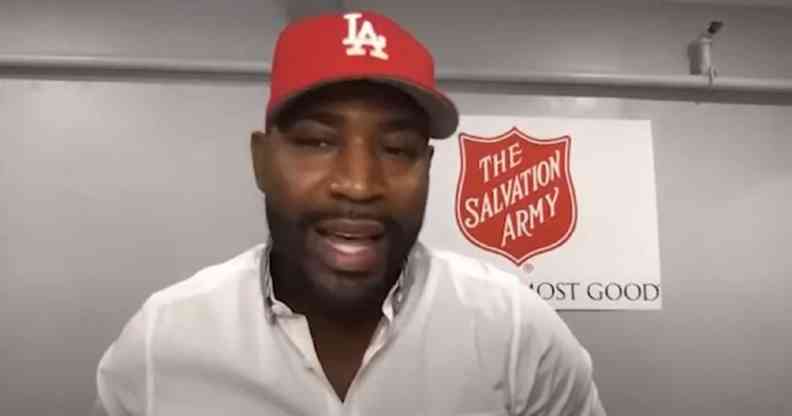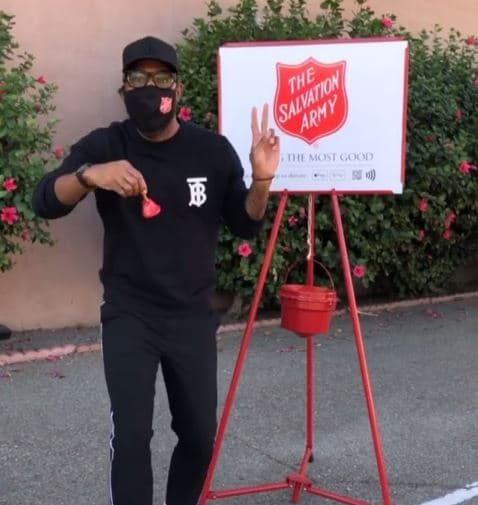Queer Eye’s Karamo Brown urged to cut ties with Salvation Army over its long, sordid anti-LGBT+ history

Queer Eye star Karamo Brown promoted the Salvation Army
Queer Eye star Karamo Brown has rankled some in the LGBT+ community by partnering with the Salvation Army, despite the charity’s long history of anti-LGBT+ discrimination.
The reality star put out a sponsored ad for the organisation’s Christmas fundraising campaign via Instagram and Twitter on Monday (7 December), ringing a donation bell and encouraging fans to give money.
He said: “So excited to help the Salvation Army US rescue Christmas this year! Due to the COVID-19 pandemic, the holidays will be harder on our most vulnerable neighbours.
“Donate through RescueChristmas.org to provide food, shelter, and presents under the tree for families in need! ??”.
The star also conducted an interview with People magazine to promote the partnership. The seven-minute interview did not address the charity’s anti-LGBT+ record, though Brown said he had previously seen “up close and first-hand” the group’s support for “some of the LGBT youth I used to work with”.

Queer Eye star Karamo Brown promoted the Salvation Army (Instagram)
The organisation, which has been dogged for years over its poor record on LGBT+ issues, maintains that it is not homophobic, but adheres to the teaching that gay sex is sinful and that same-sex unions are invalid.
While the charity asserts that it doesn’t discriminates against LGBT+ people in need, internal documents surfaced in 2014 detailing policies that actively ban gay people from serving as officers unless they remain celibate.
The ban on gay leaders makes clear: “Leadership roles in denominational activities such as teaching or holding local officer roles require certain adherence to consistently held spiritual beliefs. This would apply to any conduct inconsistent with Salvation Army beliefs and would include same-sex sexual relationships.”
Karamo Brown urged to ‘demand Salvation Army change its behaviour’.
Given the long-running tensions between the LGBT+ community and the Salvation Army, unsurprisingly Karamo Brown’s involvement with the group sparked anger.
The Queer Eye star initially disabled comments the post on Instagram, where it is marked as a “paid partnership”. But on Twitter, where it wasn’t flagged as such, LGBT+ people questioned the deal.
One user wrote: “The best thing you can do to help is to demand Salvation Army take ownership for and change their behaviour towards LGBTQ folks who come to them in desperate need.
“That would save many more lives and be a good use of your platform! You’re the culture guy, I’m sure you can do it.”
Another added: “Dude. Come on. Support homeless shelters and s**t. But through an anti-LGBTQI+ organisation. Seriously.”
"There is No help for you as a gay couple. If you & your friend agree to break up & be placed in housing separately, we MIGHT consider helping you.
But it's doubtful considering how many more worthy people are ahead of you."
That is what they told me when I came to them for help.
— Bipolar Bear (@MisterDarke) December 8, 2020
One man recalled a homophobic experience with a Salvation Army service, after being told that he and his boyfriend would only be given support if they broke up and were placed in housing separately.
He wrote: “That is who you’re allying yourself with. That is who you’re working with. It’s been nearly two decades since I went to them for help at my most desperate, and I still feel that ice and scorn in that man’s voice over the phone. I still feel the barely contained hate in his voice.
“They can try and assure us they aren’t anti-LGBTQIA all they want. I know first-hand how much this group hates us. This is not a group any member of our community should ever work with. Ring your bell elsewhere.”
Salvation Army has never fully apologised for its sordid anti-LGBT+ history.
In recent years, the Salvation Army has sought to undercut the boycott by the LGBT+ community, putting out countless statements suggesting its anti-LGBT+ legacy is a “myth” based on “misinformation”.
But despite the Trump-style attempts to dismiss criticism as fake news, it is an objective fact that between the 1980s and the 2010s, the organisation frequently deployed the might of its presence in the US and internationally to lobby against LGBT+ rights.
In 1998 the charity opted to reject a $3.5 million contract with San Francisco, resulting in the disruption of provisions for homeless people, because the city required contractors to provide spousal benefits to both same-sex partners and opposite-sex partners of employees.
In 2004, it threatened to close down shelters in New York City, again over a non-discrimination rule – at the same time as the charity also attempted to cut a deal with president George W Bush to exempt religious charities in receipt of federal funding from city ordinances banning anti-LGBT+ discrimination.
The charity also deployed its might internationally. In 1986 in New Zealand it opposed the decriminalisation of homosexuality – one of the only stances it has since fully apologised for – while in 2000 in Scotland it lobbied against the repeal of Section 28, which banned the “promotion” of homosexuality in schools.
In Australia in 2016, the Salvation Army pulled its support from the Safe Schools anti-bullying programme, amid dog-whistle attacks on the programme from homophobic activists who claimed it promoted “radical sexual experimentation” and robbed children of their “innocence.”
For many years, the charity advertised conversion therapy services on its website under a list of resources for “sexual addiction”, only removing them in 2013.
In 2017, a Salvation Army centre in New York City was slapped with a lawsuit for operating discriminatory policies towards trans people, among a number of shelters in the city accused of “assigning rooms based on a patient’s gender assigned at birth rather than their gender identity, subjecting patients to physical examinations, and forcing transgender patients into separate rooms”.
In recent years the charity has grown more sensitive to its public image, if not its actual beliefs. In 2018, volunteers were warned to stay away from discussing “hot topic issues like LGBTQ marriage” after an “increased number of complaints regarding comments made on social media by Salvation Army officers and staff”.
Karamo Brown has faced backlash before.
Brown has attracted attention in the past for his willingness to work with anti-LGBT+ politicians, defending his friendship with Trump’s former press secretary Sean Spicer after they appeared on Dancing With The Stars together in 2019.
He is the only member of the Fab Five to have publicly engaged with the Trump administration, visiting the White House in 2018 to meet with the staff of second lady Karen Pence.
At the time, he said: “I was pleasantly surprised by how open and receptive they were. Now, that’s not going to turn me into a Republican, but it does give me hope.”
PinkNews has contacted Karamo Brown’s representatives for comment.

